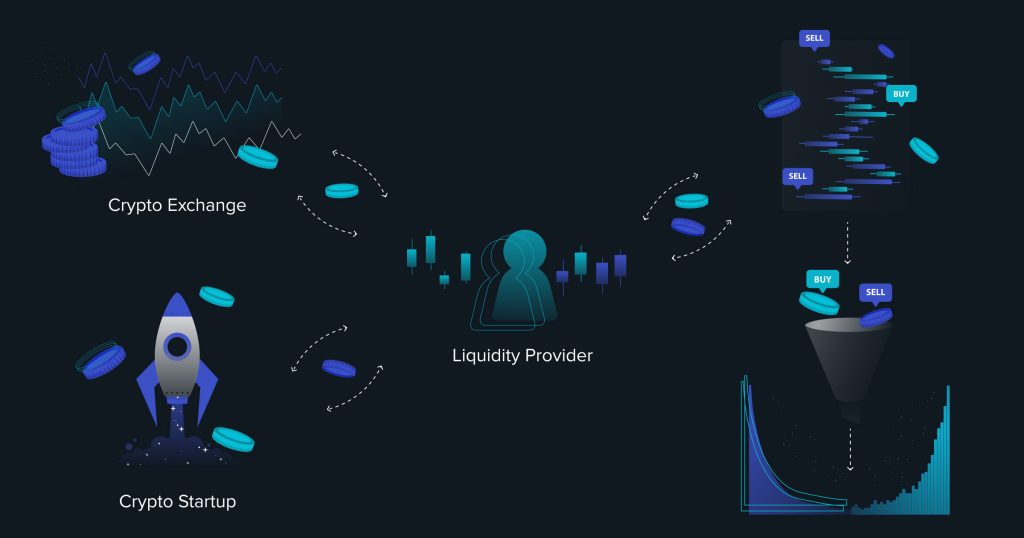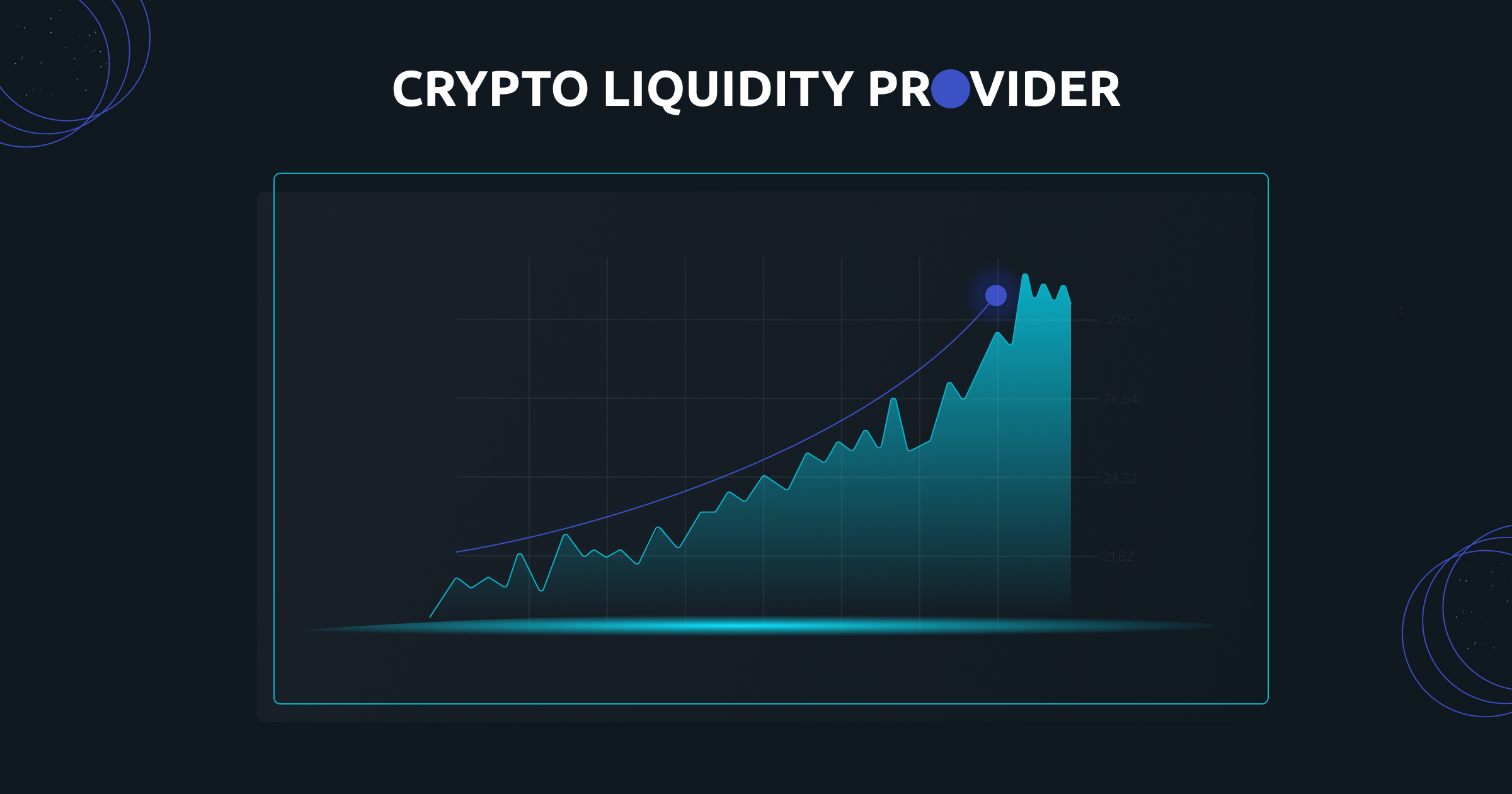The main goal of every crypto trader or investor is to multiply investments and make them work in their favor. Still, no one wants to dive into dubious crypto projects or trust money on suspicious exchanges. One and all want to deal with highly liquid assets and exchanges to be able to sell and buy tokens with no effort, no demand for a price cut, or without waiting too long for a deal to be negotiated or closed.
Therefore, crypto exchanges and crypto startups need to rely on trusted services that provide deep and reliable liquidity to increase the accessibility of cryptocurrencies for all market participants.
This is where liquidity providers come into play. These market players are some kind of power brokers who help kickstart new crypto projects or exchanges.
- They are responsible for providing crypto liquidity to any trading pair and can influence the crypto markets they operate on.
- Liquidity providers enable any crypto enthusiast and trader who enters the market to execute their buy or sell order here and now at fair prices. So, liquidity providers are crucial partners for any crypto exchange.
Our article will provide a full rundown of crypto liquidity providers and cover how to choose the best crypto liquidity provider to aid your technology and crypto business in growing.
But before we jump into defining liquidity providers, we want to go over the concept of crypto liquidity and find out why it plays such an essential role in the cryptocurrency market.
So let’s move on!
What is Liquidity? Key Points About Crypto Liquidity
The term "liquidity" broke into the crypto industry from the world of traditional financial markets such as Forex, stocks, and CFDs.
- We can define liquidity in crypto as a power creating the ability to sell, swap, or buy assets easily and quickly at a stable, close-to-market price with no price slippage.
- An exchange is liquid when you can quickly buy and sell an asset without influencing the price.
- The faster and easier it is to sell any amount of specific crypto, the more liquid that crypto becomes.
Generally, a low level of liquidity leads to a high level of volatility, resulting in price spikes. As a result, high-liquid markets usually show light price fluctuations and vice versa. Conversely, low-liquid markets usually offer significant price movements.
But what factors affect cryptocurrency liquidity and why does liquidity of crypto matter at all? Let’s find out.
Core Crypto Liquidity Factors

Bitcoin (BTC) is considered the most liquid crypto, excluding stablecoins. Nevertheless, the majority of little-known low-cap altcoins are not liquid.
Why?
The answer is simple: they don’t have sufficient trading volume and orderbook depth to satisfy possible buying interest and selling pressure. As a result, the price of such assets risks exposure to volatility every time a significant transaction occurs.

By answering the question of what factors affect liquidity of crypto assets, we decided to divide them into three main groups.
In general, liquidity in crypto markets stands on three pillars:
- Trading volume. It is the amount of crypto trading in a given period, usually 24 hours. A higher trading volume means higher trading buying and selling activity, which fosters higher liquidity and market efficiency. In turn, a lower trading volume means lower trading activity and may indicate illiquidity.

- Order book depth. It refers simply to how many assets are willing to be bought and sold via limit orders at specified prices in the order book. The deeper the order book, the higher the probability that market participants will swap cryptocurrencies according to the market value. The smaller the order book, the lower the selling price and the higher the buying price.

- Bid/Ask spread. The difference between the lowest asking (buying) and the highest bidding (selling) prices. A tight spread is a hallmark of liquid markets.

Basically, all these liquidity factors and the definition of liquidity give us a clear understanding of why it plays a big role in the market, so we can easily move on to the next part to consolidate our knowledge.
The Importance of Liquidity in Crypto Industry
It becomes clear that liquidity is a vital sign of overall market stability and health. The high liquidity indicates an increased interest in the industry. Also, it ensures that any market participant can quickly get in and out of the market. Here are some benefits of high liquidity:
- It's easy to exchange fiat for crypto and vice versa. Thanks to high liquidity, you can buy or sell cryptocurrency for fiat at any time, and quickly convert any amount without losing money.
- Effective trading. In liquid markets, there are many opportunities to take advantage of price movements. An illiquid market means that few people trade this asset, so there is no point in entering it.
- Traders get fair prices and stable markets. A liquid market means many buyers and sellers, and both sides stay in the black and get what they want. A large number of different trading volumes keeps the markets stable. The higher the liquidity, the less risk of price slippage. By the way, you can use the Good Crypto's Liquidity Checker to minimize your losses due to price slippage!
Hardly any crypto project wants to place and sell its digital assets in an illiquid exchange, just as no typical exchange wants to list low-liquid assets. Low liquidity also affects traders; ain't nobody got time for that. As liquidity of both exchanges and assets isn’t something that appears on its own, that is where liquidity providers can come to help. Let's talk about them in more detail.
What Is a Liquidity Provider?

Every crypto project or exchange once took its first steps into the crypto world. For almost all, liquidity providers have become a kind of guide or assistant.
The main task of liquidity providers is to balance the difference between supply and demand for a certain number of currency pairs. They help all market participants enjoy the minimum level of spreads and exchange cryptocurrencies at an instant speed with minimal price slippage.
“They act as middlemen between the trader and the exchange or asset and play a vital role for them both.”
As a rule, a cryptocurrency liquidity provider is a market player that provides buying and selling power by putting limit orders in the order book using specialized software and strategies. This can be achieved in a few different ways:
- Providing a massive amount of their own funds makes the order book deep enough at each price level.
- With liquidity pools from the biggest crypto exchanges
- By managing clients' or investors' assets
Such liquidity-providing crypto services may assist buyers and sellers, increasing the order book depth and making the crypto market run smoothly. But unfortunately, they are often mislabeled as market makers, which is not true, but we will get back to it a bit later.
By building a solid depth of the order book on a given crypto market, a liquidity provider facilitates the performing of a huge number of transactions and makes the spread so low that it gives any user who comes to the market the ability to execute their order at the best price instantly. It also eliminates any arbitrage opportunity. Furthermore, they make sure that there is enough bid and ask orders of any size at any price level, enabling crypto exchange users, both buyers, and sellers, to fulfill their orders whenever needed. In other words, liquidity providers play a vital role in creating a seamless trading environment on the exchanges and for crypto projects.
What Does “Providing Liquidity” Mean?
To define the term "provide liquidity," let's recall three key factors that affect liquidity first:
- trading volume,
- bid/ask spread,
- and order book depth.
Based on these highlights, we can define liquidity provision as an intermediary service of ongoing trading in and out of relatively short-term positions with the application of extra funds, thereby helping to increase trading activity, deepen the order book, and control the bid/ask spread.
How do these market participants provide liquidity? Let's figure it out!
How Does Providing Liquidity Work?

A crypto liquidity provider is an intermediary that either takes funds from a crypto exchange or a crypto project and manages them to build an order book and control the market.
- This becomes possible with unique trading algorithms commonly using liquidity management software.
- They create a huge number of orders.
- As a result, several sell/buy orders for different trading pairs drop into the order book, allowing traders to execute their orders at specified prices instantly.
Liquidity providers help newly listed projects by providing robust liquidity that allows them to trade across top-tier crypto exchanges with low slippage. As for low-liquid exchanges, they help align exchange market parameters such as spreads, trading volume, and order book depth on various trading pairs to the standards of top-performing crypto exchanges on the market. Complying with such standards attracts crypto investors, traders, and token issuers, and encourages them to deposit and trade on the exchange with their own funds.
Liquidity Provider vs Market Maker: What's the Difference?

A crypto market maker and a crypto liquidity provider are market participants who help buyers and sellers match each other. However, their roles in the crypto market are slightly different.
- As was mentioned, the task of a crypto liquidity provider is to provide enough liquidity to the order book and control the spread to make it possible for both the market buyers and sellers to execute their orders anytime they want.
- In turn, market makers have a more comprehensive range of responsibilities that may include ones of a liquidity provider. The difference is that market makers may have broader goals that may include the following:
- Keeping a certain price level,
- Moving price to a certain level,
- Creation of various trading patterns on a chart,
- Ensuring a smooth launch of trading pairs on a crypto exchange,
- Accumulating an asset X or Y during a given period,
- and so forth
Market makers not only provide liquidity and build market оrder book depth but also increase trading volume and achieve other goals by means of executing aggressive trading strategies at a specific price level.
Essentially, market makers are mainly algo or quant trading teams or firms that act as market players in a selected trading pair(s) - an intermediary between the buyer and the seller with a particular set of responsibilities. They work under an agreement with an exchange or a crypto project, an asset of which is traded on the exchange. Crypto Market Makers ensure that all trading goals and KPIs are met.
💡PRO Hint: In the crypto market, a market maker may move the price up or down through buyouts or sales and artificially keep the price at the same level with market manipulation and imitation of trading activity. Yeah, it’s still legal.
Crypto Liquidity Providers List: How To Choose The Best?
There is an excellent variety of liquidity providers on the market, and to make your projects grow like weeds, it's essential to choose the best one. So next, we will find out how to make the best choice when selecting a liquidity provider.
To choose the best liquidity provider, you need to focus on your own needs, rank them in order of importance, and consider the entire package of services and cooperation conditions that liquidity providers can offer. It is equally important to determine your budget for the services of a crypto liquidity provider so that you don't run out of money.
Today we will touch on TOP crypto trading firms that may act as liquidity providers:

1. The first one is GSR. It is a global crypto investor, crypto exchange liquidity provider, and market maker focused on providing institutional participants with crypto liquidity, risk management, and structured products in the crypto ecosystem. They are known for their most robust and fast digital asset trading systems, which were created by the leadership team, including Goldman Sachs, Citadel, J.P. Morgan, and Two Sigma. They collaborate with the most well-known crypto projects, exchanges, and financial institutions that are just starting their crypto journey. However, a big name implies big checks. The cost of GSR services is one of the highest on the market.

2. Alameda Research. Alameda Research is one of the largest financial services companies specializing in liquidity provision and managing digital assets. It provides a wide range of services, including market making for coins, derivatives, and altcoins across the top crypto exchanges. Unfortunately, they cooperate only with top projects and coins, so the prices for their services are pretty high. You can find more information about Alameda Research in our new article.

3. BitQuant Capital. Securing the services of high-quality, top crypto liquidity providers, costs a lot of money and requires many bureaucratic hurdles to be jumped before the launch. But what if we told you that the majority of these services provided by these trusted firms could be obtained under more favorable conditions and with a much more flexible and personalized approach? BitQuant Capital is a value-driven market maker and one of the top-ranked crypto trading companies working with the major crypto exchanges and well-known token projects. We offer world-class and best-suitable trading and exchange listing solutions for your crypto project while focusing on your critical demands. With the most robust scalable technology, we are more than ready to establish a fair and liquid environment for your crypto startup and accelerate its growth.
You can decide which company is best for you. Still, you can be sure that BitQuant Capital provides a wide range of market-making and liquidity-providing services at reasonable conditions. Moreover, we will always find solutions according to your requirements and budget for long-term success.
Conclusion
Liquidity providers are some kinds of players who are behind the scenes of the crypto market, but nevertheless, they are irreplaceable. They guarantee both markets and traders consistent liquidity on crypto markets, helping newly listed projects to grow and all crypto exchanges to become more trusted and top-performing.
Because market makers are essentially liquidity providers with a broader range of services, we advise you to deal with the top-ranked crypto trading market makers such as BitQuant Capital.
BitQuant Capital is a value-driven market maker and one of the top-ranked crypto trading firms focusing on digital assets and exchange liquidity, both for CEXs and DEXs. We offer the best solutions for CEXs and DEXs. We offer the best solutions for every project based on their preferences and requirements. At BitQuant, we are ready to establish a liquid environment to accelerate the growth of your crypto startup at fair prices.





